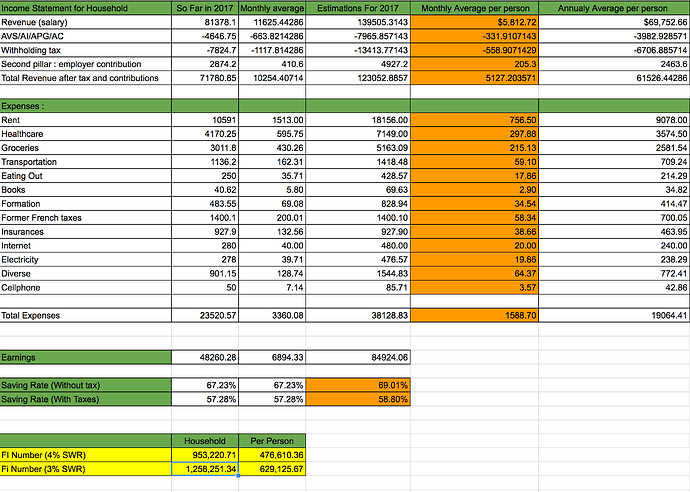I also looked again at the maths used for personal finances. Let’s consider the following :
My initial capital is C0.
Each year, my savings are S and my average annual return is r%.
Let’s define C(n) by the Capital I have at year n.
Obviously, we have
C(0) = C0
C(1) = (1+r)*C(0) + S
…
C(n) = (1+r)*C(n-1) + S, because each year i gain r% of the capital I had the year before and I saved S as well.
We can prove by recurrence that C(n) can also be written:
C(n) = (1+r)^n * (C0 + S/r) - S/r
Which is more practical to solve equations!
Time needed to reach FIRE :
Now, let’s say that we want to reach a target capital T after N years. What would be N?
C(N) = T = (1+r)^N * (C0 + S/r) - S/r
Solving for N, we find :
N = ln((T +S/r)/(C0 + S/r)) / ln (1+r)
In my case, with the following parameters :
C0 = 172 900
r = 10% (let’s hope!)
S = 84 924 CHF
T = 953 220 (if we assume a 4% SWR)
I find N = 5.95 years. Which is quite good!
If I change my SWR to 3% to have a target T = 1 258 251 CHF, then N = 7.59 years.
So it looks that we should be able to reach our target before being 40! Good news then, even if it is only a mathematical model and a lot can happen in-between (especially regarding the value of r parameter) …
Tipping point :
Another value I find very interesting is what I call the tipping point : It is the moment when your revenue from your investments are equaling your savings.
When we reach this point, it is clear that we are very close to FI or already FI.
Let’s translate that into an equation. At tipping point moment,
r * C(n-1) = S with n = Tipping Point
we replace the value of C(n-1) to get to :
r* ( (1+r)^(n-1) * (C0+S/r) -S/r) = S
solving for n, we get :
n = 1 + ln( 2S/(S+rC0)) / ln(1+r)
Using S= 84 924 CHF, C0 = 172 900 CHF,
If r = 10%, then tipping point = 6.32 years
If r = 7%, then tipping point = 9.27 years
If r = 10%, then tipping point = 5.18 years
Let’s see in future posts if these indicators are reliable!
(and sorry in advance if this post was too geeky for some readers…  )
)




 So far she was doing small jobs with kids, mainly in order to learn german.
So far she was doing small jobs with kids, mainly in order to learn german. . I have a hard time to estimate how much costs this will add, and we will have to adjust our budget next year. However, we are decided to not follow the consumer craze for baby related items : we already found a free second hand crib, and we plan to use cloth diapers and to breastfeed.
. I have a hard time to estimate how much costs this will add, and we will have to adjust our budget next year. However, we are decided to not follow the consumer craze for baby related items : we already found a free second hand crib, and we plan to use cloth diapers and to breastfeed. )
)